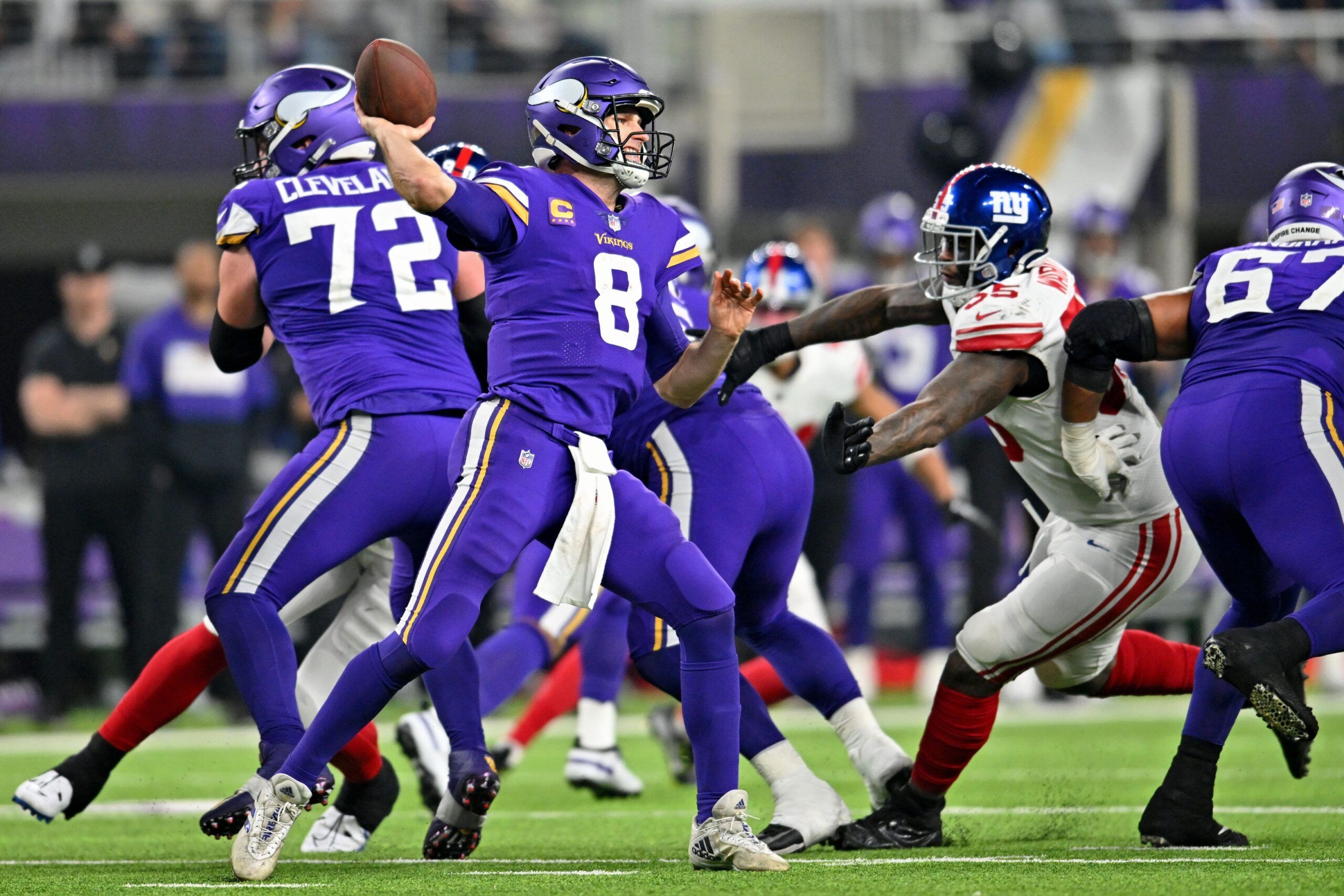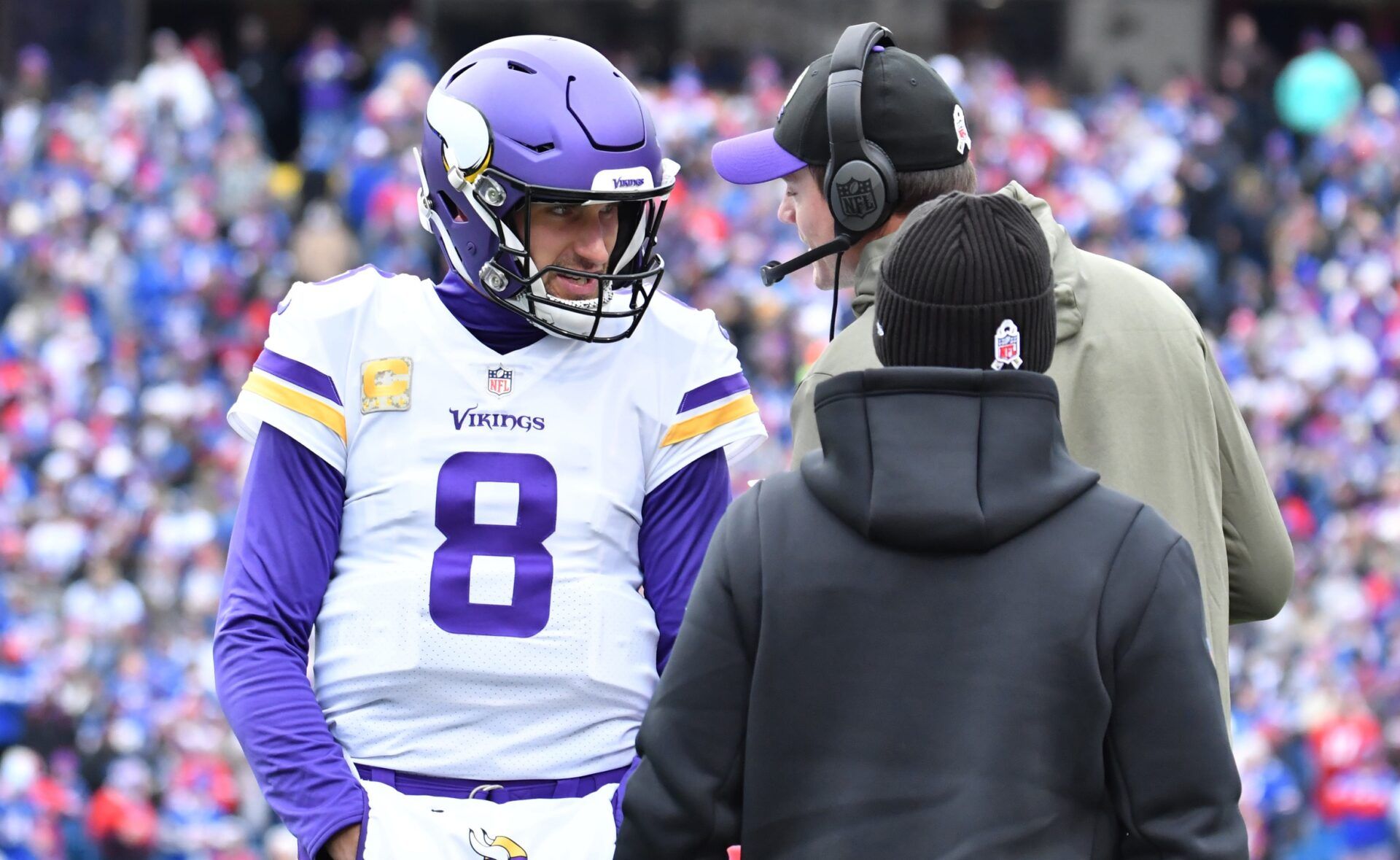With the news that the Minnesota Vikings and Kirk Cousins have ended their extension negotiations until the end of the 2023 NFL season, it’s become clear that the Vikings don’t have a long-term plan at quarterback.
That’s not the end of the world, but it helps focus the discussion on roster-building and the nature of the roster. Already, the Vikings have radically changed their character. They’ve let go of some of their franchise mainstays, including Dalvin Cook, Adam Thielen, and Eric Kendricks.
Changing their QB situation in a year would complete that transformation and establish that the Adofo-Mensah/O’Connell era in Minnesota is markedly different than the Spielman/Zimmer Vikings. The problem is that there’s no pathway to success without a quarterback and no clear understanding of what that solution might be.
Minnesota Vikings Have Never Expressed True Commitment to Kirk Cousins
Minnesota hasn’t exactly hidden these intentions, though they may have fumbled in their attempts to acquire a new QB. Access Vikings reported on March 20 that Cousins’ agent had sent Minnesota a contract offer well below his expected market rate, about $40 million a year for three years.
On the surface, that’s a good deal. It’s close to the deals Derek Carr and Jimmy Garoppolo signed and equivalent to the average value of Daniel Jones’ deal with New York as well as the one Dak Prescott signed in Dallas. Because it wouldn’t take effect until 2024, it’s actually discounted against those contracts by a fair degree, too.
However, the team turned it down, perhaps in part due to the fully guaranteed nature of the contract. Cousins would be 38 years old entering the final season of that proposed extension, which might be one reason the Vikings would be hesitant.
Approaching the draft, Minnesota was considered longshots to secure a quarterback. The top four were expected to go early on, and with the Vikings picking at No. 23 overall, they wouldn’t have had a shot at drafting one of them. But they indeed inquire about trading into the top five for a quarterback, according to NFL Network’s Tom Pelissero.
With that said, Minnesota wasn’t overly committed to a QB. They passed on the opportunity to draft Will Levis, who fell past them into the second round.
Still, it’s difficult to ignore comments made in USA Today by general manager Kwesi Adofo-Mensah before the 2022 season, where he characterized Cousins as a quarterback teams need to live with rather than the kind that produces wins on his own, saying, “We don’t have a Tom Brady” or “a Patrick Mahomes.”
On the other hand, Adofo-Mensah said last April after the draft that “Kirk doesn’t need to show anything to me. Kirk has played football at a high level before I got to the Minnesota Vikings. Last year, we won 13 games. I don’t know what he would need to prove to me or anybody else.”
Nevertheless, he addressed the fact that the two sides couldn’t come to an agreement, saying, “Sometimes you come to a place where you decide, ‘Hey, let’s talk later. This is a solution for now.’”

Cousins Has Tabled Extension Talks
Before voluntary minicamp, Cousins took the podium to address the media. In the final year of his current contract, the question of an extension came up fairly naturally. He said, “I think we’ll probably talk about the contract next March. And until then, just focus on this season and the job to do right now.”
He went on to say that it’s his job to “earn” an extension, mirroring language he’s used in the past close to contract deadlines.
With contract talks suspended until after the season, there’s not much the Vikings can do if Cousins decides to look for a place with better security. Minnesota wouldn’t even have the option to franchise tag Cousins. Because the restructure in the contract contains two void years, it technically extends beyond the end of the league year.
The void date in the restructured contract occurs after the franchise tag deadline, according to Pro Football Talk. That means the Vikings genuinely have no control over Cousins or their QB situation heading into 2024.
It’s entirely possible that Minnesota has the talks Cousins alludes to next March and extends him. But for now, the relationship looks somewhat strained, and the odds that Cousins is their 2024 quarterback seem low.
The Vikings are projected to have a fair amount of cap space in 2024 — Over the Cap estimates $53 million — but they also need to make room for extensions to Danielle Hunter (if he’s not traded), T.J. Hockenson, and Justin Jefferson, along with potential decisions for Marcus Davenport and Jordan Hicks. With Cousins’ contract structures, it’s difficult to create room for those players, even if it isn’t impossible.
The biggest problem might be that the Vikings are probably not bad enough to earn a top pick in the draft, meaning they’ll miss out on the Drake Maye/Caleb Williams hype. If Minnesota drafts a quarterback, they may have to settle for a second or third-tier passer.
The Vikings could move heaven and earth to make another attempt into the top five of the draft, but the fact of the matter is that they didn’t have the ammunition to do so in this year’s draft — when they had more valuable roster assets to use as trade pieces, including Cousins himself. In 2024, without those pieces, it will be more difficult to get into the top five.
Fifth-round pick Jaren Hall could develop into a starter, much like fourth-round pick Dak Prescott or what Washington hopes Sam Howell will become, but the chances of that are pretty low. For now, the Vikings simply don’t have a plan at quarterback.

